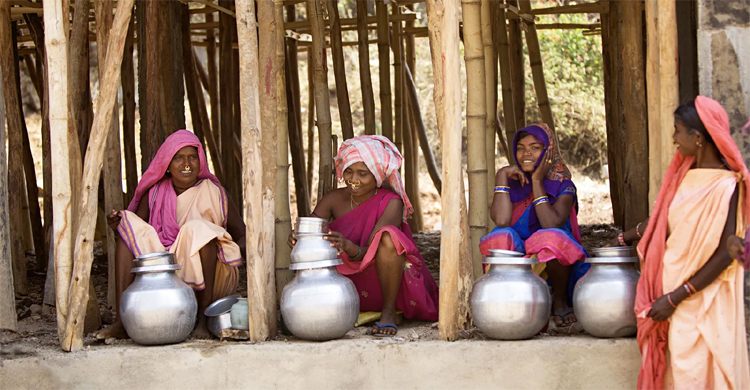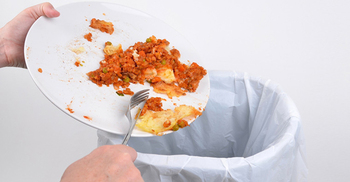Mahua: The Indian liquor the British banned

I smelled the sweet flowers before I saw them. During an early morning drive inside the Similipal National Park in the east Indian state of Odisha, I had stopped near a picturesque waterfall where thousands of pale-green blooms were falling from the surrounding trees and carpeting the forest floor.
"These are mahua trees," said Suresh Kisku, my guide from the Santhal tribal community. He pointed towards the cluster of short, stout trunks and dome-shaped canopies that edged a small clearing.
The mahua tree, or madhuca longifolia, grows abundantly in the forested plains of western, central and eastern India, where tribes – such as the Santhal, Gond, Munda and Oraon – who have inhabited the area for the last 3,000 years, consider it the "Tree of Life".
Traditionally, theses tribes have used its flowers, fruits, branches and leaves for food, cattle fodder, fuel, art, medicine and even as currency to barter for grains. They've also revered it through vibrant folk festivals, songs and verses. Perhaps its most well-known use, though, is in the form of a sweetish liquor with strong floral notes simply called "mahua", which is brewed over a pot still in a meticulously detailed eight-day process.
Later that day, Kisku brought me to his house on the fringes of the forest, where his mother and younger sister, Geeta, crouched close to a sturdy metal pot containing fermented mahua juices over a woodfire. Two other pots were positioned over the larger pot to brew the spirit that would condense and travel through a tube to be stored in a container on the mud floor. After a while, Geeta dipped a ladle into the brew and threw the liquid into the fire, the flames shooting up in a white blaze. "This means the mahua spirit is pure," said Kisku.
That evening I slowly sipped the clear, colourless liquid from a small cup made with leaves that Geeta had handed to me. The freshly distilled mahua liquor went down my throat with a delightfully fiery trail, leaving a smoky, floral aftertaste.
"Why haven't I tasted this before?" I wondered.
From ancient times until the late 1800s, indigenous families like Kisku's were free to distil, consume and sell mahua liquor. However, the production of what was considered a "country spirit" by the Indian government suffered a heavy blow during the British Raj rule in India. Mahua was deemed a dangerous intoxicant that was a threat to public health and morality, so colonial lawmakers created legislation – such as the Bombay Abkari Act of 1878 and Mhowra Act of 1892 – that not only banned or restricted the distillation of the spirit, but also clamped down on the collection and storage of the mahua flowers by indigenous tribes.
Fewer mahua flowers led to clandestine brewing that was often infused with impurities being added as filler. The resulting decline in quality only furthered the British Raj's agenda at the time: to control the production of local spirits in general, as the revenue generated from imported alcohol from places such as Britain and Germany helped fund military occupations.
"While some colonial officials recognised the cultural and nutritional importance of indigenous drinks like mahua, the threat to revenue took precedence", said Dr Erica Wald, a modern history professor at the University of London.
Interestingly, even after India gained independence in 1947, the old economic and social mores stayed intact. "The state remained closely associated with the monopoly on sale and production of alcohol just like the erstwhile colonial rulers, and mahua remained under stringent laws and limitations," said Wald.
"Alcohol was a frequent target for temperance advocates and early nationalists," Wald continued. "Boycotts and pickets of alcohol stores, and the insistence of some nationalists that alcohol was 'foreign' to India, meant that even drinks like mahua, which were so important in the lives of many tribals, were lumped together as problematic."
Thus, mahua remained classified as a low-quality, "dangerous" drink, and the tribal people were denied the right to produce and sell it beyond traditional village markets.
"It tells you the nature of post-independence Indian elites who were highly disdainful of the lifestyles of the indigenous population," said Krishnendu Ray, professor of food studies at New York University. "It ended up producing a lot of mediocre, homogenous stuff that shaped the Indian liquor industry."
Against the legacy of this socio-political canvas, it would take a few strong entrepreneurial voices interested in rebranding mahua as a quality craft spirit, while also trying to bring about changes in excise legislations, to begin to lift bans on the liquor.
"We introduced mahua in Goa, made under the IML (Indian-Made Liquor) category, a tag we got after much persuasion with the government," said Desmond Nazareth, who launched Mahua Spirit and Mahua Liqueur under the brand DesmondJi in 2018.
The Goa-based craft distiller also sells mahua in Karnataka, the only other Indian state to recognise mahua as an IML opposed to a "country spirit". According to Indian law, country spirits cannot be sold across inter-state borders, so by branding it as IML, it can reach a larger consumer base when sold in other states.
For the last couple of years, a change in attitude has slowly been occurring among local governments and agencies. For example, in 2021, the government of Madhya Pradesh declared mahua as a heritage liquor, and the government of Maharashtra state changed its archaic laws to legalise the collection and storage of the flowers by local tribal groups. For the first time, in that same year, a government organisation called the Agricultural and Processed Food Products Export Development Authority shipped dehydrated mahua flowers, which were collected by the tribal population from the forests of Chhattisgarh, to France.
While some states are ending bans on mahua, lifting them at a pan-India level will make it a much more viable business venture for distillers.
Susan Dias, director of Mumbai-based start-up Native Brews started brewing mahua with Vasantdada Sugar Institute back in 2018. She said, "We have our recipe in place, and need the regulations around production, distribution and marketing of mahua to ease up on a national level to commence with our first batch."
Additionally, Dias believes that it's important to create a micro industry that supports indigenous mahua growers economically. According to Dias, "A sustainable development model for the mahua industry would be a direct forest-to-bottle approach, where local tribal groups will have the rights to collection and storage, sell them directly to distillers and thereby monetise their flowers."
Nazareth, for instance, sources flowers from the central Indian forest belt in collaboration with tribal groups in Odisha and Madhya Pradesh and the Chhattisgarh State Minor Forest Produce Co-operative Federation, which promotes trade and development of forest produce and implements socio-economic welfare schemes for indigenous tribes.
And when it comes to the flowers, quality matters. Nazareth is also aiming to restore the reputation of mahua as well as modernise its production to make it more appealing on a wider scale.
"We select only food-grade flowers that are hygienically collected on nets and then sundried on mats or in solar driers," he said. He also elaborated on how his company's mahua uses standardised yeast for fermentation and multiple distillations (opposed to traditional single distillation) to maintain consistency in the taste, potency and clarity of the batches that are packaged and consumed at the international standard of 40% alcohol/volume.
Shatbhi Basu, one of India's best-known mixologists, believes that elevating the traditional methods is important for mahua's appeal as a global drink.
"With defined parameters of production in place, mahua can truly be a globally acclaimed drink like tequila, sake and pisco, all of which started their journey as small, local community-driven spirits," she said, adding that the clean and smooth flavour profile of quality mahua lends itself well to cocktails and has a very low concentration of methanol, a congener responsible for hangovers.
Nazareth believes that mahua is the perfect contender to emerge as India's national heritage spirit and that it could become popular on the global stage as well. "Thirteen of the 28 Indian states produce mahua, and it is the only distilled spirit in the world made from a naturally sweet flower, which creates its unique flavour profile," he said.
In a project they refer to as "Mahua to the World", Nazareth and Braganza are planning to bring the spirit to the UK in the summer of 2023, and later to North America and other global markets.
Branded for years as an illicit indigenous tipple, it has been a long road for mahua to arrive at the doorstep of the premium mainstream market in India and beyond. I asked Kisku how he feels about this mahua makeover.
"I don't really understand much of this," he told me over the phone. "But I'll share the news with my folks that our sacred tree and its flowers are finally getting some recognition. And we will celebrate over an extra glass of mahua."
Source: BBC





